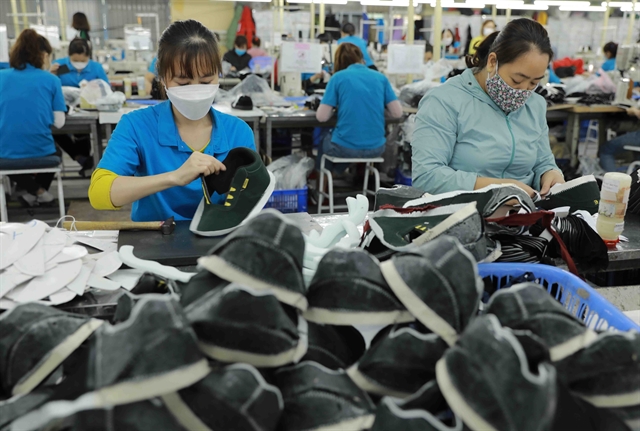 Society
Society

 |
| Workers perform quality checks on a footwear production line for export at Hà Tây Chemical - Weave Co Ltd in Hà Nội. — VNA/VNS Photo Vũ Sinh |
HÀ NỘI — With high development goals and increasing international integration, one of the key focus for Việt Nam's Directorate for Standards, Metrology and Quality (STAMEQ) must be to review and perfect the sector's legal frameworks, especially amendments to the laws related to international agreements.
These include the Law on Product and Goods Quality, the Law on Standards and Technical Regulations, and other documents related to the Comprehensive and Progressive Agreement for Trans-Pacific Partnership (CPTPP) or the European Union - Việt Nam Free Trade Agreement (EVFTA), according to deputy minister of science and technology Lê Xuân Định.
The formation of the national standards and technical regulations must pay special attention to technical application, advanced technology and national energy development, the environment, and renewable energy, alongside national and people’s interests.
Nguyễn Hoàng Linh, STAMEQ’s deputy director general, said: “The amendments of the Law on Standards and Technical Regulations and Law on Product and Goods Quality will make a major impact not only in management but also in the awareness of businesses and consumers.”
This adjustment would focus on developing a national standardisation strategy and transparency responsibility following Việt Nam’s commitments to free trade agreements.
In addition, the Law on Product and Goods Quality would also have new regulations on increasing the capacity and developing the national quality infrastructure.
This would be the basis that comprises laws, regulations and administrative decisions that aim to recognise qualified products and services according to official requirements.
These legal adjustments were also expected to support companies in enhancing their competitiveness, productivity and international integration process based on technology and innovation.
According to Science and technology deputy minister Lê Xuân Định, in 2022, the system of national standards (TCVN), technical regulations (QCVN) and local technical regulations (QCĐP) had been improved to ensure cohesion, efficiency and make way for trade, higher competency and access to large markets.
STAMEQ has also drafted the National Standardisation Strategy for 2030, which will be submitted to the Ministry of Science and Technology (MoST) and the Government for approval.
Aiming for comprehensiveness and optimisation, the document is expected to become a driving force behind the national quality infrastructure, product and goods quality, and businesses’ productivity, competitiveness, and innovation capacity.
In 2022, STAMEQ issued more than 6,700 Global Company Prefixes (GCP) and over 250 Global Location Numbers (GLN).
The Directorate also works on the project of implementation, application and management of the traceability system, also known as Project 100, a move to protect consumers’ interests and facilitate exports.
Noting that technical barrier is one of the main obstacles in international trade, STAMEQ has been focusing on providing support to enterprises, especially in meeting the requirements of safety, hygiene, environment, animal and plant quarantine, packaging, as well as traceability and certification.
Regarding the development of the related legal frameworks, STAMEQ’s deputy general director Hà Minh Hiệp said: “The simplification of administrative procedures is aimed to improve the efficiency of the State management in the new context, creating an open environment for businesses to invest, produce, trade, while also protecting consumers’ interests for socio-economic development.”
Alongside draft strategies and development plans, the directorate also set goals to improve the inspection and assessment of organisations, evaluation tools and standards, export products and digital transformation.
Hiệp added that this year, Việt Nam needed to well-implement the agreements that the country had committed to while also strengthening international integration regarding science, technology, standards, metrology and quality.
Different ministries and departments would also need to work with the MoST on the technical trade barriers, avoiding the case where these issues hinder Việt Nam’s fulfilment of its agreement membership obligations. — VNS




